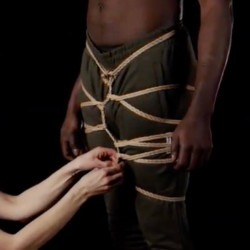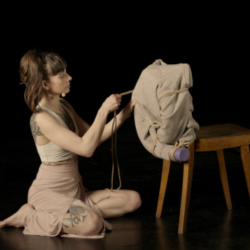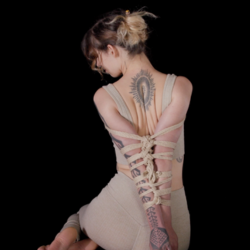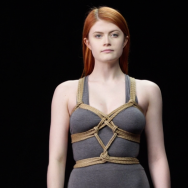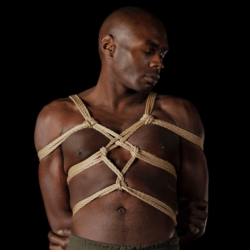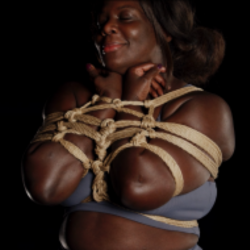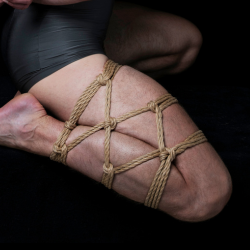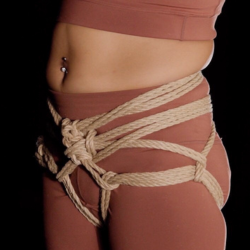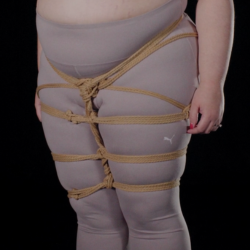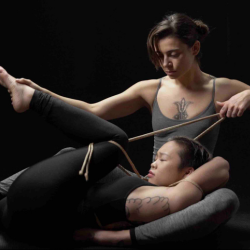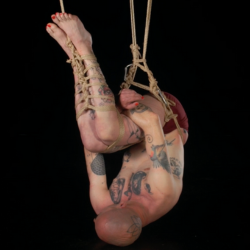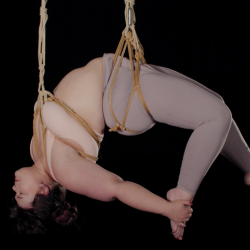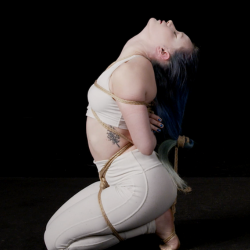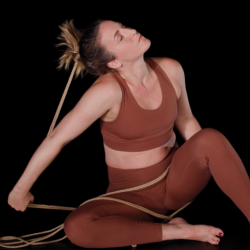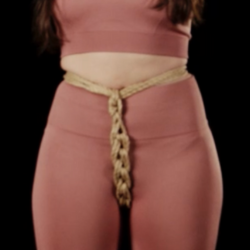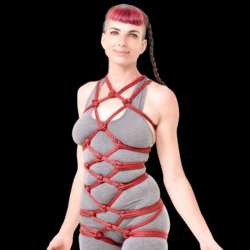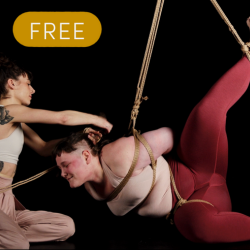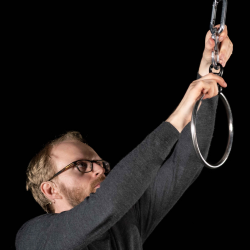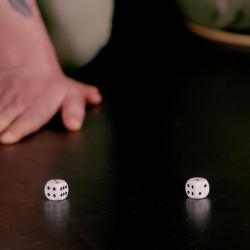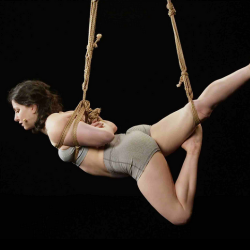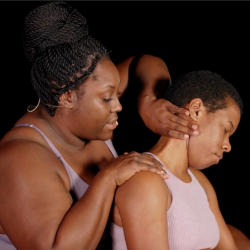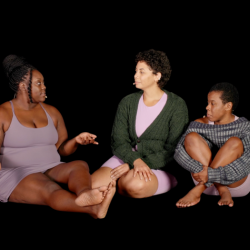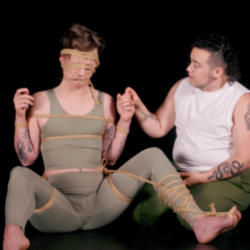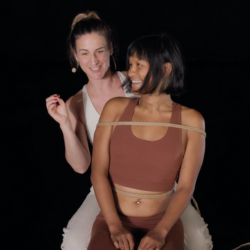EP 50
AXEL
"I can't wait to learn what my rope style is!" Axel discusses her journey into kink, navigating whitewashed kink spaces, the emotional depth of rope bottoming, and the personal growth she’s experienced through self-tying and exploring the intersection of mental health and kink.

Axel’s pleasure is through pain. As a masochist, Axel joined the kink community when she began exploring different methods of energy release. Through Axel’s journey, she has gained a thriving passion for helping others find identity through kink, self-love, and expression, as well as creating safe spaces that allow knowledge of kink to flow thoroughly. Axel is a switch that enjoys rope, impact play, power exchange, and service.
[00:00:08] Wren Hello to all my guys, gals and non-binary pals. Welcome to the Shibari Study Podcast. I'm your host, Wren. Shibari Study is an online learning resource offering video tutorials for beginners through advanced practitioners. Whether you're brand new to the world of shibari and needing to learn the basics, or a seasoned rigger or rope bottom seeking inspiration to push your practice to new places, there's something for you at shibaristudy.com. And today I'm talking to Axel. Axel uses she/her pronouns. She's a black, indigenous, queer submissive living in Atlanta, originally from Boston. She's into rope, wax and sensory deprivation and a million other things. Axel, I'm so excited to talk to you today.
[00:00:53] Axel Thank you for having me here.
[00:00:55] Wren Oh my God, of course. Before we started recording, you were telling me a rather salacious story about how you're not into ketchup at all.
[00:01:07] Axel I think it was the texture and the smell of it. I remember, I'll never forget, there's this place in Boston called Cisco's Hot Dogs, and they sell twelve – like a foot long hot dog. And my dad came back and it had ketchup on it, and I screamed, and I threw the hot dog out the window. I'll never forget that day. And he was like, What is wrong with you? And ever since then, I was just like, It's been icky, it's gross, I don't like the smell. My sisters and my brothers, they would play on that and do like, pranks and leave ketchup bottles in my bed or little packets everywhere to gross me out. And I would have, like, a freakish breakdown and cry. It's gotten better now. I could pass you a ketchup bottle, but I'm not going to consume ketchup.
[00:01:52] Wren Actually, I have a friend like that with pickles where he would get a sandwich and have pickles on it, or they'd be a pickle on the plate and he wouldn't be able to eat the food, essentially. It was really hard for him.
[00:02:03] Axel It's, it's just like, I think it's just something about it in my blood that's just like, absolutely not.
[00:02:09] Axel Yeah. Well. In your defense, ketchup smell is really pungent and gross. But. So you said you grew up in Boston and now you're living in Atlanta. When did you find (…) and queerness and all that kind of stuff?
[00:02:24] Axel I started my (…) journey... I wanted to say, actually, during Covid, I got on FÖ just looking for connection. I came out as queer when I was 18, but I wasn't... I didn't really have a queer lifestyle or had queer beings like myself. So I was looking for spaces, and I was actually in a relationship with, a girl. And she was just like, Do you know that you're (…)? Like, I'd be like, Hit me! And she'd be like, You like that? And I didn't know what (…) was. And she was like, You're a (…). Look this up. You should go on FL. This is where people like you are. And it was just a different world that I was just like, Oh, (…), this is a thing. Like there's people like myself.
[00:03:09] Wren It's so funny because that's a lot of people's stories. They don't know what it is. And then finally they find FL or Tumblr or something, and then they're like, Wow, this whole world existed. And I had no idea.
[00:03:22] Axel Yeah, I definitely knew I was like a leather dike prior to knowing what leather culture was, like I had – I remember I bought myself a motorcycle jacket, all leather, and I had Doc Martins and I had a leather vest, and my mom loves leather, so I was just like, Well, my mom's a leather girl. I love leather, too. But I didn't realize, like, there's a whole subculture for people that love leather.
[00:03:44] Wren Does your mom love leather in that way? Or is it just as just like loving leather.
[00:03:50] Axel Not in a (…) way, but as it's like a fashionable sense? Like I have to have a leather jacket and leather pants and a leather skirt that I'm just like, Mom, I think you're a leather girl. You don't know it yet.
[00:04:01] Wren It's like questions like, I wonder if she found this group was like, there's more people there like you. There's a lot of people that really like this thing. I also really like clothes and getting high quality garments and stuff like that. I feel like I would be super into leather, but it's a world that I haven't really jumped into and I'm kind of afraid to, because once I feel like I would step into it, it'd be over for me.
[00:04:29] Axel Yeah, now it's kind of over for me. I'm at Barking Leather, which is like a really big leather shop here in Atlanta, like every week. They know me personally. I'm here to get custom or I'm like, Do you have my item? And Troy was like, actually, you're back again. And I'm like, You know, I'm back again.
[00:04:45] Wren Like, you need to cut me off.
[00:04:47] Axel Yeah. I was like, I can't stop now. It's just like a new piece every couple of months. I'm just like, Yeah, this fits. I know leather is supposed to be gifted, but I feel like you have to gift yourself, so that's how I look at it.
[00:04:59] Wren What a great workaround. That is kind of the best gift to give.
[00:05:07] Axel It's like, this is what I deserve, and if nobody is going to give it to me, I should give it to myself. Or why wait for it when I can have it now?
[00:05:14] Wren Were you a kid that opened Christmas presents early or wanted to?
[00:05:19] Axel I grew up Muslim, so unfortunately we did not have Christmas. I did celebrate Kwanzaa. My parents were – they didn't want to leave out the holiday spirit. And Kwanzaa was a thing. And we were given gifts on Kwanzaa. But I was the surprise me kid. Like, I don't want to open anything early. I knew what I got already because I was the kid that's just like, I don't want anything else but this, and this is exactly what I want. And I was usually just given exactly what I wanted. So that was it.
[00:05:46] Wren I loved that. You knew what it was. You just had to wait for it. You're like, I'm fine.
[00:05:52] Axel Yeah, like, this is what I want mom and dad, don't buy me anything else. And they're just like, are you sure? I'm like, I'm 100% sure. Like, I don't need any surprises. This is what I want.
[00:06:02] Wren I've actually always thought about this because I'm not Catholic, but I do celebrate Christmas. Did you feel left out as a kid at all?
[00:06:12] Axel Absolutely. I felt left out. Honestly, I did not celebrate my first Christmas until moving to Atlanta in 2019. I have all my cousins here, and when it was time to put up the tree and decorate and cookies and Christmas carols, I'm looking at them like I don't know what is going on. So definitely growing up, they were just like, You didn't watch this Christmas movie? Or what about this? You don't know about that? I'm just like, I am a grown woman now. You need to fill me in. And I felt like I lived under a rock. Especially during school when there would be like, you know, Secret Santa. And I just couldn't participate. I just didn't know. And they didn't made me feel like left out. I just felt like I lived in, like, a different world. But now I love Christmas. Like, I'm definitely in the Christmas spirit. I love decorating a tree. Just like I like the meaning of Christmas, of just being with family and having that support. It's not really about gifts, but like the process of giving. And I think that's really important.
[00:07:10] Wren Yeah. Agreed. I have no religious connotation with it in my own Christmas practice, if you will. There's no real... I don't I just like the fact that there's a cool tree, and it's something that comes around every year and it's consistent. And I think that's really fun and cool.
[00:07:30] Axel Yeah, I like that a lot too about the holidays. I used to be a Grinch. Like I hated Thanksgiving until New Year's, like the winter time. Maybe it was a seasonal depression, but I was not with it. I was just like, Absolutely not. I'm under a rock. Don't talk to me. But now I'm just like, I want to have a Thanksgiving party and a Friendsgiving party and a potluck and New Year's eve parties. I'm a very big party thrower. I love hosting people at my house. So I think that's one thing that moving here, like finding my family and my tribe that really helped me a lot.
[00:08:02] Wren Was moving to Atlanta also coupled with finding FL and (…) like that?
[00:08:07] Axel Yes, I was living in Orlando like we talked about previously, and there was just not like – I think after Pulse, the queer scene in Orlando drastically changed. And I knew that coming to Orlando, when I was visiting Atlanta, I was like, escaping the hurricane like everybody does once in a while in Florida. And I went to visit my cousins, and they just showed me around town. And I just never seen, like, you know, Midtown and Piedmont, just gay as it is and as black as it is. And I'm just like, Well, these are where my people are at. So that was like a main take on why I moved here. I was like, I'm going to find people like myself. I could dive deeper into a community and I don't feel so isolated.
[00:08:50] Wren Yeah. That's huge. Not feeling isolated and feeling you have people that have shared interests is massive.
[00:08:56] Axel Yeah. And then finding FL and just seeing like different events and (…), queer things going on in the city and also seeing people that look like myself, I was just like, Wow, this is a vibe. Like I'm not alone. Like there's people out here that do what I do, are interested in what I'm interested in. And that was like really helpful.
[00:09:14] Wren Yeah. I want to talk about you rope bottoming and your approach to bottoming and education, things like that. But before we started talking you were talking about spaces being whitewashed.
[00:09:25] Axel Yeah, I've experienced that we had a really prominent dungeon before they closed here in Atlanta. That was definitely whitewashed. When a black person, POC comes into the room, everybody stops and stares. Like that's not a good feeling, or you're trying to ask for help, or you have questions about certain equipment and gear and you're being ignored or I – we ran – I randomly had somebody walk through a scene one night, you know, like we're being suspended and someone just walking up under somebody bottoming, and it just doesn't feel good. You feel ignored. You feel invisible. And I think that's one thing that prominent me with education and bottoming is creating spaces for people like myself. Like we want to have a safe space. You know, I always say, like, as a black person, nobody likes being the only black person in the room. As often as it happens, it's very awkward. It doesn't feel... It's just awkward, you know? And it's not like a race thing, but, you know, sometimes it is. And, you know, you, you're made to feel like you're the oddball. And I don't think anybody likes feeling like the oddball.
[00:10:27] Wren Do you ever feel like there are times where people are trying to make you feel more comfortable in a space where you might be the only black person, and it's actually doing the opposite, making you feel more uncomfortable?
[00:10:40] Axel Yes. Like, the overly friendly person that is just like, you know, it's not genuine. You can feel the energy is not genuine. And I think it just comes off with that vibe. You could definitely tell the difference where someone is trying to be welcoming and inclusive and they share a place spaces with black people in POCs, and they you see that often, and then you realize the people that don't and are uncomfortable and just like odd about it, trying to make you feel respected and kind. And that's great. Like the effort is okay, but I think there's different ways to go about it.
[00:11:20] Wren This might be an impossible question to answer, but – so these events, I would imagine, are created through a very white lens. What are ways that these events can be truly more inclusive? We talk about the word inclusivity a lot, but what is like real inclusivity look like?
[00:11:42] Axel There's different ways to be inclusive. I think number one is if you're hosting an event or you're an event board, have POCs on the board. Like if you're trying to host events to be inclusive and there's not one black person or a POC on that board trying to help make these events inclusive, it's not genuine because you don't want to see people of color in power or have that same privilege that you have. I think pricing is, well, accessibility to events, a lot of (…) events – (…) is expensive – I don't think anybody talks about how expensive (…) could be. Like buying a rope kit, getting a rig or, you know, anything that you're interested in that. Leather costs money, price planning events to, like, price people out. Who could afford paying $100 for, you know, a rope intensive or $150-200 a tying pair. Like you immediately exclude a group of people. So I think pricing, having people of color on the board, I think advertising that it's going to be inclusive as well. Like we – this is POC or Bipoc friendly or excluses – not excluses, sometimes exclusive events are needed, but making sure that that is known like this is a safe space for you guys, [00:12:56]because most of the time we'll show up and we don't see anybody like us, and then we're like, we're not going to tell our friends to come. [5.3s] Like, that's one thing about black folks, we're gonna tell people if the vibe are vibing we're going to tell people, Hey, this is a place for us. And if we don't feel that, we're not going to let other people know to come.
[00:13:11] Wren You said a lot of really awesome things that I want to dig into. I'm like scribbling at my notebook so quickly. You talked about how [00:13:19](…) is expensive, [0.4s] and people don't mention that. It is so hard to put time into and money.
[00:13:27] Axel Yes. And I think as like a newly – I'm 25 and I just got like my first big girl job and big girl salary and I'm just like before that I was saving just to be like, I need to get rope. It took me forever to buy a kit. Because I'm just like, where am I going to dish out an extra $100-150 to get rope? It took me forever to get a rig. I just got my rig last month, and I had to save for it, I'm just like, if I put this much money aside, I could buy a rig. And it's not cheap. It's not. I love leather, I spend around 100 to $200 every time I walk into Barking Leather, this is not... It's not a cheap sport. It's not like poor people just trying to get together and just do stuff. It's like you actually kind of have to invest, especially if you like nice things like latex suits. I really been getting into latex lately. Catsuits are like $500. Yeah.
[00:14:16] Axel So it's very it's hard. I think it's saving ,trying to find side hustles. I crochet in my free time to make extra money, just like little things. Putting things aside, if I really want it and know that it's like a necessity for me, I'll make sure I can find a way to get it.
[00:14:37] Wren I love that. [00:14:38]You also said seeing people of color in power and not just being at the event, [5.7s] is a very different thing.
[00:14:46] Axel Yes, I know it's different. I served on a community board here in Atlanta for two years, and just being in this space where we're able to know our target audience and knowing who we are advertising to, as a black person POC I think a lot of white spaces, they're like blindsided of a group of people, like having only white people on the fliers or having demos, and you only have white bottoms, like things like that. Black people, I can only speak for myself but, you don't feel comfortable. Like you don't feel seen. You don't feel heard. And, I think wanting to be seen and heard is really important in all spaces, black or not. You know, everybody wants to be included. So having that inclusivity shown, it's really important.
[00:15:37] Wren Being seen and heard is what (…) is. Like what it literally is.
[00:15:43] Axel Yeah. And then a lot of times like our voices are forgotten about that because, you know, we don't have leadership or we don't have a form of power where we could have a space. You know, renting spaces is a lot of money or having events and trying to, you know, find ways to have an outreach to the community. I think that's really important.
[00:16:03] Wren Yeah. You talked about exclusive spaces and how they are important to have, like exclusive events, but that is not the solution to the problem. And I would love to talk a little bit more about that, because I do think that that is a huge trend. Where it's a- – it's something that's being put in in addition and it's not changing from the inside the spaces that are already there. It feels like, here's the real event, then here's the other event. And I feel that a lot with being trans and queer.
[00:16:38] Axel Yeah. And I think I've experienced that here too, in Atlanta. Like you're saying, the separation of events like we'll have like, POC only munch, and then there's the normal munch and it's like, why can't we just all come together? And I think POCs do need a space of our own. There's a lot of times where we don't have that own space, which is important, but it's also like, we don't want to be the other group, you know. Like, we should all be inclusive. And I feel like that's really important. And I think a really big mission of mine next year is how can we all come together? We're all (…). We're all queer. Most of the time. We fall into this intersectionality category. Everybody is different in their own unique way. Like what ways and how can we shape and form an environment that caters to us all?
[00:17:29] Wren You were talking about education and rope bottoms needing a place to explore. What are some ways that rope bottoms can connect and chat about shared experiences?
[00:17:44] Axel There's a couple of groups, one that I'm newly been introduced to that I really love is VERB. Very Engaged Rope Bottoming. They have amazing events online. Whiskey Ginger, they're based out of, I think, Colorado. And they started the group and I went to one of their events and I never felt more included and engaged ever. Just talking from bottoming perspective and that form of education that is needed. I also really enjoy when rope classes have bottoming experience attached to it. It's not all about just tying and knots and friction. It's also about how does the bottom feel, how are they breathing, how are they interacting right now? I think that's really important in rope spaces. I think I've talked about it a few times, like on Shibari Study, sometimes I – not get upset, but a little sad that some of the bottoms aren't mic'ed up. Like they also need a mic to talk. Like they also have a perspective on how they feel. And I'd like to see that more on of Shibari Study. Just different ways that we could come together and talk about our experience. I joined a bottoms only Google shared group that's been going around that's really amazing and talks about education, vetting tops. So many things that I've never even knew existed until I joined this group. And I'm just like, This is such a safe place. I'm learning so much from different bottoms. We have a voice. There's education that can be shared amongst us, and rather than it being so top focused.
[00:19:26] Wren Do you remember anything specific from VERB, from the Very Engaged Rope Bottom stuff that was different than other spaces? Do you remember any like, the stuff y'all talked about?
[00:19:39] Axel The one I went to was about navigating rope relationships, and it was so important to me. Just like, transitioning out of a rope relationship and dynamic and just having a safe space of bottoms that also experienced the same thing that I was going through. Just like the emotional aspect to having a safe space to talk. I think bottoming is so tender and sometimes so soft, and getting that from others in the group was really special to me, because I view bottoming as like sacred work. Like it takes so much energy and practice and devotion to bottom and suffer for somebody. So to hear others talk about their experience of suffering for somebody and then maybe letting that somebody go and learning how to suffer, maybe in their own way, like how I do with self-tying, which is a beautiful transition and helped me in my rope journey.
[00:20:48] Wren I want to talk about self tying a lot. I, self-tying is by far my biggest blind spot in the rope world. I've never self-tied, but before we get into that, it sounds like rope to you is super super based on the person that you're doing it with.
[00:21:05] Axel Rope connections... I don't think it's talked about enough or often. In some times it could, of course, it could just be platonic. Some rope connections could be romantic, but there's still a connection, like there's still an energy that is being exchanged. Whether you agree or disagree. I think like we don't hear about that enough in rope. Like how sacred that energy is. And I think especially scenes that I've had being topped or like been bottoming from a bottoms perspective is I'm giving myself to you at this very moment. I'm so vulnerable right now, at this very moment. My arms are tied behind my back, my mouth is gagged. I'm inverted right now. Like my, I'm putting my life on the lines, to be honest, and I don't think people think about that. Like this could go very left really quick. And I'm putting my trust and my all with my life with you right now.
[00:22:07] Wren Yeah, I hear it talked about in ways that I generally don't like, which is, something, that says something about me and the lens that I'm viewing these discussions through because I haven't thought about it in the ways that you're saying where it seems like you have a very positive outlook on it, which is refreshing and cool to hear. Because when I hear the conversation, I hear people saying, I can heal you with my rope, and we're going to go so deep and I can take you so deep. And that's scary to me usually. So it's nice to hear you being optimistic and looking at it through a really happy viewpoint of that connection between people. It leads me to a question of how are you forming these relationships? Because it sounds like there's a lot of communication between you and whomever is tying you.
[00:23:05] Axel Yeah, I've tied with... I've been topped honestly by like two or three people. It's been very minimum, but... It goes with a lot of communication first. I think boundary talk, having set intentions and goals. Goal setting is important. Knowing where each other's headspace is at before a scene is really important, and I think the overall goal after a scene like, what do you want to feel or accomplish on both ends? Like, do you have a (…) top? Do you have like a (…) service top? Like, are you in a (…) state right now? Do you want to suffer or do you want to, you know, be dainty and cute right now? I think those are like big factors in like how a scene could go.
[00:23:57] Wren That makes total sense. You said another thing that is important to you is mental health in (…) and that intersection between the two. And how do you use rope to... I don't know if improve your mental health is the right phrasing there, but what role does rope play in mental health for you?
[00:24:22] Axel Yeah, and I'll be honest, I've been diagnosed. I'm a Gemini, so I'm bipolar. It's not a Gemini – but I've been diagnosed with bipolar disorder for the past five years. And just in my mental health journey itself, it's been a whirlwind of just internal healing, therapy, trauma healing. And when I found rope, I looked at rope as a meditative form, like getting into a rope space or subspace and something that I've never felt ever outside of rope. And I would come to terms of just my suffering in that moment and knowing that, Hey, this is hard, but this isn't the hardest thing I've ever been through. This has nothing to compare to, like the emotional state that I've been in and I... Especially now with self-tying, I usually journal before tying and after I tie just to see where I'm at, and it's helped unlocked a lot of doors for me. Just healing, self-healing, regulating mood and emotions. I think that's one thing with any mental disorder is just mood swings or emotional dysregulation and trying to, you know, regulate yourself. And rope has definitely help me just regulate. Like I'll be really anxious or I'm feeling like jittery and I'm just like, let me put rope on my body, let me compress my chest, let me bind my legs, let me feel like I'm in a cocoon right now. I think that's really helped. And I've seen my self improve drastically in rope and in (…) with my mental health. Just having an outlet of creativity and expression and self-awareness and understanding boundaries. It's just been like a massive door opening for me.
[00:26:16] Wren Yeah. It's huge. You talked about journaling. What are some of the journal prompts that you use before and after?
[00:26:23] Axel Yeah, before. I usually just do like a check in, like, how are you feeling today? What do you want to feel during this time? Where, what space do you want to go into? And then after I tie, it's like a reflection of the tie. How did you feel? What, where were you breathing the most? What could have you done differently? What aftercare do you need for yourself right now? How can you get into a better space for your next scene? So I usually ask those questions, or I free write a lot of the time. Just like any train of thought. I don't know, sometimes when I'm bottoming, random (…) will come into my head during rope like, Damn, did I pay that bill, or like did I, you know, just random stuff, like, Did I like, feed my dog today? So I would just think of like other random things in my mind that would come to my head that maybe have came up during a scene and just like, go from there.
[00:27:20] Wren Do you choose self-tying when the option to tie with someone else is present? Is self-tying different than tying with someone else? Or is it what you do when you cannot tie with someone else?
[00:27:34] Axel Oh, that's a good question. I... This past year has been like my self-tie journey, and I at first was tying when I didn't have a top to tie with and I was missing rope. Now it's more of a preference. Like I rather self-tie if I'm not in a bottoming state for somebody else. Like I rather have a spotter and just be in my own energy, then, you know, go through that energy exchange with somebody else because it could be a little tiring. So it's been more of like me finding myself in a way that I couldn't previously.
[00:28:09] Wren That makes total sense. I think that's a lot of my hesitation self-tying is that I know in the beginning, for me, it's going to be me just figuring it out and finding what I like and stuff. And... But I do think you can go super deep in it since you don't have to worry about another person. Even if you're super connected with that person, you're on the same page. You still have to be concerned about that person and that energy. And what they're bringing in changes things a lot.
[00:28:39] Axel Yeah, and with self-tyingf, I love just me focusing on myself and the energy that I create in that space. Like if I'm tying and I feel like crying, like I'm not going to be worried right now. Like if I'm crying and like, Oh my God, something's wrong. And I'm like, No, I'm crying because I'm emotional. I need to release it. Like, I love that about self-tying. It's just like, I'm not on the edge of what somebody else feels or is thinking at the moment. I could 100% invest my emotions into myself.
[00:29:06] Wren You were saying that rope is a lot of mind over matter.
[00:29:11] Axel Yes, I personally have experience just – when I first started bottoming, I used to like have full blown panic attacks. Like, I would, yeah, I would freak out. I would hyperventilate really bad and my top at that time was just like, Breathe, slow down your breath. It's like, it's mind over matter. Like, you got this. And hearing those words every time we tie, it's just like breathe or, you know, you got this. And just putting myself in a different headspace rather than, like, freaking out or panicking or getting super anxious has really helped. Like, I am strong. I do this often. I'm a (…). Like, this is, this is me. I know what I'm doing and I'm really good at what I do. I used to be really insecure as a bottom too. Like I'm not good enough or I don't look as pretty as, like, you know, the really famous Instagram girls, like, I'm not them. I'm thick. Like, I had all these, like, connotations in my head, and I just had to get out of my head about that. Like, rope is for everybody and it's for all bodies. And, you know, it really is mind over matter. Like, get out of your head. You're okay. You're safe.
[00:30:24] Wren I like that you said I do this all the time. I do this all the time. Because it's funny when we go into it and we're in a state where we're scared, we forget about all the... Experience that we've built up over, over years.
[00:30:41] Axel Yeah. And I was just... I was at a point where I was honestly panicking, like, I just do the (*gasping sound*) and I have asthma, too, so that didn't help, and I would just be like, Oh my goodness. And I always had to be reminded, like, you were so strong. You have been in such a worse pose. Like you've held something so longer. Like you could do it. And I think tops really should encourage that self-talk and that, you know, enthusiastic affirmations during tying like affirming your bottom is so important. And I don't think that's talked about enough, because at some times you may not feel good enough or, you know, something could go left and we feel like it's our fault, or putting that self-doubt and blame. [00:31:25]Like, but affirming, I think top to bottom, affirming one another. It's really great during a scene. [4.7s]
[00:31:30] Wren Talk to me a little about affirmations. What are some of your favorite ones?
[00:31:35] Axel Oh, I keep this app on my phone called 'I am'. It's really good. And my favorite ones are 'I'm abundant, I'm loved and safe, I'm creative'. All is well in my world. My house is a safe place. I love affirmations.
[00:31:57] Wren I love that. When are you giving affirmations to the top? Because a lot of the times we view aftercare as coming from the top to the bottom are coming from the person that is doing the tying, putting the rope on the person to the person that is being tied. When, when are times that you as a bottom give those affirmations to a top?
[00:32:20] Axel I usually love doing it during a scene. Like letting them know like, Uh, this feels really good, or, I like this tension, or Oh, that's how you feel. I like just like... Giving energy back to them, letting them know, like Hey, I'm safe. You're doing a fantastic job. Like even – tops deserve aftercare too. So after scene I used to love giving hugs and snuggles and head rubs and just like you took care of me, you're so great. Just like things like that. It's just affirming them as well. Letting them know, like, I know I'm in good hands and your hands are good.
[00:32:55] Wren Yeah. And your hands are good. That's awesome. It's a lot harder to say those things as a top, because they just put out all this stuff and hurt a bottom in some way or cause discomfort. So I think that that's, that's something that is needed.
[00:33:11] Axel Yeah. And I've seen tops like pull back with, Did I hurt you too hard? Are you bruised? Or like, I'm great. I'm living for this. Like you did not hurt me in a way that I did not want to be hurt consensually. Like, everything over here is good. And I think affirming that makes them feel better. Just letting them know, like, Hey, you know, everything's good in this world. Like I always talk about, like, good pain versus bad pain, especially when it comes to bottom education. Like there's good pain where you're, like, enthusiastic about it. You're like, hit me harder, I want it more. And then there's bad pain where you're like, this is discomfort. It's uncomfortable. Like I need to check in. Knowing the difference of the two is really important. I think tops having that as well. Like, Okay, I'm doing good pain right now, but I know bad pain may be coming soon, so let me check in. So, you know, things like that keeping that energy flowing and the scene going is really important.
[00:34:05] Wren The conversations around rope I think are best served usually from a very conceptual place, talking about feelings and emotions, because learning how to tie a single-column on another person is not the hardest thing in the world. There's a million different videos to show you that, including Shibari Study, who pays for this podcast, so we should thank them for that. And also, it's easy to learn how to tie a futo or a TK. You follow a video and you practice those things. But with self-tying, the learning curve is very different. Because you're tying these things on yourself, and then you're also dealing with the emotions and the discomfort that comes along with that. So how did you learn to self-tie? What was the first thing you learned doing that?
[00:34:52] Axel I started my self-tie journey, like, really (…). I tied a single-column on my waist and I suspended a single column from my waist. And that just gets me (…) going every single time. I was just a single waist shorty. Everybody was looking at me like, Are you crazy? And I was living for it. And then... I know. Thank you to Shibari Study, because that's where I learned a lot of just tying different harnesses, technique. I have a lot of self-tie friends that we would do labs together and we would self-tie. They would self-tie themselves and I was following them along. But it's really hard. It is a huge learning curve. I'm still learning, like I'm nowhere near where I want to be. KissmedeadlyDoll is like my admiration for self-tying. I love her work. Like she's just amazing. I drool over all her pictures. I'm just like, I can't wait to get like you one day. And it's really hard. And it's just like, How? Yeah.
[00:36:00] Wren It's so hard.
[00:36:02] Axel I just love – now it's more like sensational play for me. Like I'm really (…) with my self-tying. So sometimes I just, like, mess myself up with, like a single-column and like, single futo hang and I'm good. Like, that's all I need to get my rope fix out. Now that I'm learning how to tie, I really would like to tie others. I'm still not in that space yet, but I feel like it would get easier on my self-tie journey if I learned to tie on other people.
[00:36:30] Wren When you start tying other people, I would like to be at the first- I would like to be at the front of that line, because you're going to be the best (…) rope top coming from being a bottom and then self-tying and then tying, you're going to know exactly what hurts and what is great and how to push people. Oh my God, you're going to be amazing.
[00:36:50] Axel Oh my goodness. I'm blushing right now.
[00:36:52] Wren I'm like, Sign me up.
[00:36:54] Axel My friends was telling me, was like, Axel, you as a top. That's a game changer. I was like, Really??
[00:37:00] Wren Yeah, let's get that going. Let's fast track that. I support it.
[00:37:06] Axel And for myself next year, like all 2024, I'm taking a step back from education and just getting into, like, learning. Like I'm going to so many cons next year. Tethered Together, Ropecraft, so just taking classes, like, education is so important and I spent the past two years like bottoming and co-teaching. And now I think it's just my time to learn and like, hone down on my skills, my craft, develop my own rope style. Because, like, I'm so ready for people to get in my rope. Like, that's going to be so hot and I just can't wait for it.
[00:37:40] Wren I love how you're saying things like, I can't wait to develop my own rope style. I can't wait to grow into these things. It's so cool because it's like you're creating this container that you're going to grow into, and that's awesome. Instead of... I think a lot of people in all things that we're learning as human beings, we want to say, I'm not there yet and be really hard on ourselves and say, I don't know what my rope style is yet, and I hate that. But the way you're talking about it is, [00:38:08]I can't wait to learn what my rope style [1.2s] is. That's cool.
[00:38:12] Axel Yeah, I'm, I just feel like life is such a learning process. And as much as somebody may think they know it all, you don't. And there's always room to grow. And it's look at myself like a little like – I love plants. I'm like a crazy plant lady. I have like over 50 going through my house. So I look at everything is just like a garden. Like once you nurture it and water it and speak life to it, it's just has nothing to do but grow and grow abundantly. So I think about that with rope, just how abundant rope is, how young I am. Like I just like, I look at – me in five years from now, I'm only two years in my journey. Me ten years from now, 15 years from now, I'm just like, what? Like, oh my goodness, I'm so excited.
[00:38:54] Wren Oh my God. Well, thank you so much for giving me the social media clip. You're like... That was beautiful. I don't know how to phrase this, but there is a huge thing about new people in the scene. We love to gatekeep. We'd love to say, Oh, you can't do that until you're X amount of time into your journey. We love to do that as a rope scene. And this just goes to show that you're being authentic about being two years in, and you're saying stuff that is valuable and so important to hear and is an inspiring and has nothing to do with the amount of time in the thing. It has to do with your own self and your ego, and how open you are to sharing.
[00:39:38] Axel Yes, I 100% agree with that. I think especially newbies coming into the rope community. I just want to say like don't be scared. Like the water is not rippling, there's no tsunami. Like, I know it could be really intimidating to like, message your first top and wanting to get suspended and not knowing where to go. But just know, like rope is a journey and it's going to take time. Like your first suspension may not be... You know all that, or you may have not wanted to stay up longer. Like I used to only be suspended for like 10 to 15 minutes, and now I could be suspended for an hour or two hours. So it's just like, it takes time. And the more you nurture it, the more you allow yourself to give yourself space to grow, the more you're going to grow.
[00:40:24] Wren I love that, I love that. I would be curious to know what you think makes a really good rope class.
[00:40:33] Axel A really great rope class is fun and is inviting and creative. Like how many times are we going to do single columns one a one, like... Switch it up. I think, one rope class that I was really fond of was, you know, [00:40:53]Tying All Bodies is a great rope class. Ms. Reemah teaches that, that was awesome. Jumping On Top. [5.3s] Like just different classes that are, you know, meant to be fun and creative is important. I created like a Sink Into Me class for futomomo. It's just like, how do you sink into a futo? We don't really have classes talking about that. Or I had a class, I did like (…) in me. Like how to be, like, the best (…) in the world for rope. Like, just fun stuff. Just have really fun stuff in your classes. People that want to go to and learn from them is really important.
[00:41:29] Wren I love that you said just have fun.
[00:41:32] Axel Yeah. Rope should be fun. It shouldn't be so serious and scary. I think some people think (…) is like, especially vanilla people are like, super scared or intimidated. When I bought my rig, my cousin was just like, Oh my God, this is like – she knew I suspended. She's like, I've never seen this in my life, like, this is crazy.
[00:41:49] Wren I think people are so obsessed with doing things seriously, because when you add a degree of seriousness to it, it feels official. You feel like you're doing the right way.
[00:41:58] Axel Yeah, and like, there's no right way.
[00:42:01] Wren No, there's not. And that is why there's gatekeep-y BS and there's stuff then placed to, to like... I don't know. To keep that quote unquote serious vibe there and then power. But... Well where can people find you, Axel, if they want to connect with you?
[00:42:20] Axel Yes. You could find me on Instagram @_itsaxelbaby_ and on FL at It's Axel Baby.
[00:42:30] Wren What a great name. It's Axel Baby... Well, thank you so much for being on. I love how open you were on this. And it, it was inspiring to me. Very, very inspiring.
[00:42:43] Wren Thank you, Wren. And I really want to give a big shout out to Shibari Study. Like I love this platform. It has taught me so much. It's created such a great community for me, and I couldn't be more thankful for a space like this.


